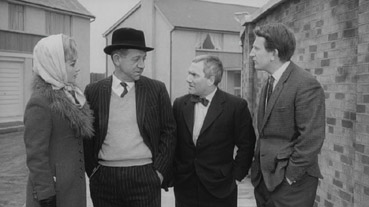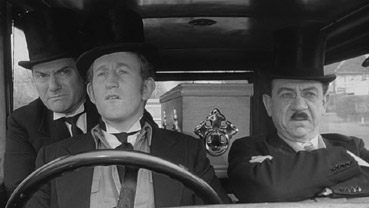|
A
quick glance through the main credits of The Big
Job and you'd be forgiven for thinking you'd stumbled
on a spin-off from the Carry-On film series. Produced by Peter Rogers, written by
Talbot Rothwell and directed by Gerald Thomas, it features
a typically bouncy Eric Rogers score and a cast that includes
series regulars Sid James, Joan Sims and Jim Dale, not to
mention a small string of other then popular comedy performers,
including Dick Emery, Lance Percival and Deryck Guyler.
Its previous UK video
release was even titled What a Carry On: The
Big Job. With so much comedy talent on board, how could you go wrong?
Well...
The
basic setup has been employed and modified by a number of
films over the years and there's absolutely nothing wrong
with that. Would-be criminal mastermind George Brain (Sid
James) and his colleagues Booky (Dick Emery) and Dipper
(Lance Percival) pull off a carefully planned bank robbery,
the Big Job of the title. A series of bungles sees all three
arrested and banged up for fifteen years, though not before
George has hidden the loot in the hollow of a distinctive
looking tree. When released, the three head straight back to retrieve
their money, only to find that a new town has been built
on this once isolated country spot. The tree, miraculously,
has been left untouched, but is now located in the back
garden of the town's new police station.

Stupidity is a tricky business in comedy and having dopey
characters is a very different thing to making a similarly
afflicted film. Paradoxically, the most successful comedy
idiocy is always the result of some very smart thinking – by all means have stupid people in unrealistic situations,
but for heaven's sake do more than hand them a priceless
vase and spend ten minutes just waiting for them to drop
it. And while one, two or even a small band of idiots can
be funny, if everyone in the story is as dumb as a post
then they're likely to wear out their welcome long before
the halfway mark.
Which
brings me back to The Big Job, a briskly
paced film with a likeable and enthusiastic cast but whose
world is one in which common sense and intelligent thought
are alien concepts. Quite how the ironically self-named
Great Brain even planned the opening robbery is a mystery,
at least if his later thinking is anything to go by, but
having done so he and his gang of buffoons prove hopelessly
unqualified to execute it. Dropped at the bank by his wide-eyed
and ditzy girlfriend Myrtle, George immediately shuts his
coat tails in the door of the car, and in the rush to help him Dipper
falls down a ladder and Booky sets his foot on fire. Finally
it's Myrtle who frees him by cutting the coat with scissors.
It occurs to no-one, including the Great Brain himself,
to simply open the door. Their getaway plan is equally
ill-considered and sees them flee the crime scene in a hearse
disguised as morticians, but driving slowly so as not
to arouse police suspicion. Fine, except they get changed
in front of the main witness and park
the hearse almost directly opposite the bank, so are clearly seen leaving in
it. Thus the cops instantly know who they're looking for
and have no trouble at all catching them up.
But
it's once the gang attempt to retrieve the money that the idiot
factor really kicks in. The police station is run by the
world's most useless police sergeant (played by Deryck Guyler),
who says things like "We've far more important things
to worry about than suspicious incidents" and is preoccupied
with the police choral society's production of The Pirates
of Penzance. The Great Brain, meanwhile, having set
himself and the gang up in lodgings opposite the police
station yard, embarks on a series of increasingly silly
schemes to retrieve the stolen cash from the tree. Firing
a rope over the wall with a whaling harpoon or spending
five days to dig a tunnel underneath it might have comedy
value if it were not perfectly obvious to even the slower
audience member that they should just go and get another
ladder (their first attempt failed when the ladder
they nabbed from an eloping couple was recaptured) or better
still two – if Dipper can steal tunnelling tools, a seaside
telescope and a harpoon gun, this shouldn't prove too much
trouble. And since the two workmen who take five days to
do two hours' worth of tree surgery are given full access
to the yard and the tree in question, and since Dipper already
has their tools, I can't be the only one wondering if The
Great Brain has ever heard the terms Bluff or Disguise.

OK,
The Big Job never pretends to be sophisticated
comedy, but it has the potential to be a lot smarter than
it settles for and tends to play dumb at the very moments
you want it to be clever. It certainly has curiosity value
as a social document, with George pressured into a hasty
marriage in order to share a rented room with Myrtle, and
while both she and landlady Mildred (Joan Sims) appear to
be desperate for sex, the very idea is uninteresting to
George and terrifying to Booky. This is the sort of thing,
of course, that has helped create the image of Britain as a sexually
repressed nation to outsiders looking for easy and derogatory
classifications – it reflects not the attitudes of the general
populace of the time, but those of the studio heads, politicians
and censorship boards.
If
you can accept the dopey second-half plotting and behaviour
then The Big Job is a harmless enough entertainment,
and its initially locked-in-time attitude to women does
prove to be a partial smoke-screen for a female empowerment
ending, though one that could also be read as a reflection
of a then male fear of aggressive and domineering wives.
It's the cast, inevitably, that provide most of the fun,
from Sid James' irritable befuddlement and filthy laugh
to Jim Dale's ludicrously boyish enthusiasm, a performance
that almost plays like an audition for panto. But surprisingly
it's not Sid who steals the show here, but Dick Emery – chiefly remembered for the camp characters in his later
TV sketch show (mention his name to many who remember the
series and they'll immediately come back with it's most
renowned catch phrase "Oh you are awful!") – whose blend of weary cynicism, fact-spilling monologues and marital
terror here are very nicely judged and give a tantalising
taste of the film that might have been.
Framed
1.78:1 – which looks about right – and anamorphically enhanced,
this is another very clean print with good contrast and
sharpness, although what looks like a little edge enhancement
has produced the odd bit of digital shimmer on diagonal
lines. Some compression artefacts are also visible in areas
of low detail, but on the whole this is a decent transfer.
The
soundtrack is Dolby 2.0 mono and a clean one with no obvious
problems.
None.
The
sort of daftness that you'll find in many a Carry-On
film but without the smart thinking that distinguishes the
series at its best, The Big Job is a curio
with a likeable cast but is not as funny or witty as it
could or should be. It looks good on DVD, though, and it's
interesting to watch Dick Emery quietly steal the comedy
acting honours from under Sid's nose.
|